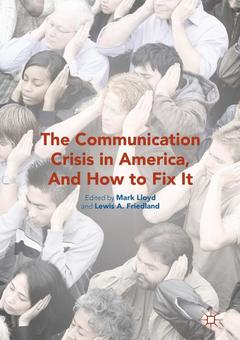The Communication Crisis in America, And How to Fix It, 1st ed. 2016
Coordonnateurs : Lloyd Mark, Friedland Lewis A.

with foreword by Michael X. Delli Carpini, Annenberg School for Communication, University of Pennsylvania, USA
This book critiques U.S. public policy about communication and offers guidelines to improve public safety and create strong democratic communities. The lack of effective emergency communication, basic information about health care, education, jobs and the economy, and civic life is at a crisis state, creating problems for the whole community, not just a vulnerable few. The Communications Crisis in America is not because of changing markets or new technology, it is the failure of public policy. The authors include economists, sociologists, journalists, lawyers and a diverse group of media and communication scholars, all offering an urgent call to action and difficult, but achievable steps forward.
Forward Michael X, Delli Carpini.-.Introduction Lewis A. Friedland and Mark Lloyd.-.Section 1 New Approaches to Solving the Communications Challenge.-.1 America’s critical community information needs Lewis Friedland.-.2 Understanding our new communications economy: Implications for contemporary journalism Phillip Napoli.-.3 Researching community information needs Katherine Ognyanova.-.Section 2 Communication Challenges in a Changing America.-.4 All Lives Matter: Critical communications and American diversity Jorge R. Schement and Jason Llorenz.-.5 Feminist perspectives on critical information needs Carolyn Byerly and Alisa Valentin.-.6 Ethnic media and the social incorporation of new Americans Matthew Matsuganis and Vikki Katz.-.7 Do Spanish-language broadcast media serve a changing America? Federico Subervi.-.8 The whole community communication infrastructure: The case of Los Angeles Minhee Son and Sandra Ball-Rokeach.-.Section 3 Government Capture and Market Failure.- 9 Confronting market failure: Past lessons toward public policy interventions Victor Pickard.-.9 Tripartite regulation in the public’s interest: The overlapping roles of the DOJ, FCC, and FTC in consolidation of the communications industry Allen S. Hammond IV.-.11 Same ole, same ole: Service agreements and local television news Danilo Yanich.-.12 Bridging the content gap in low-income communities James Hamilton and Fiona Morgan.- 13 The online participation divide Eszter Hargittai and Kaitlin Jennrich.-.14 Media deserts: Monitoring the changing media ecosystem Michelle Ferrier, Gaurav Sinha, and Michael Outrich.- Section 4 Net neutrality is Not Enough.- 15 The constitutional case for addressing critical information needs Mark Lloyd and Michael Park.-.16 A provocation on behalf of the excluded Ernest J. Wilson III, Sasha Costanza-Chock, and Michelle Forelle.-.17 “A public trust” unrealized: The unresolved constraints on U.S. public media Wick Rowland.-.18 Addressing the information needs of crisis-affected communities: The interplay of legacy media and social media in a rural disaster Dharma Dailey and Kate Starbird.-.Conclusion Lewis Friedland and Mark Lloyd.
Mark Lloyd is Professor of Professional Practice of Communication at the University of Southern California Annenberg School, USA. He has been an associate general counsel at the Federal Communications Commission, and headed the communication policy program at the New America Foundation. An Emmy-award winning broadcast producer with experience in public and commercial radio and television, including NBC and CNN, Lloyd has also managed national advocacy campaigns focused on a wide-range of communication policy issues.
Lewis A. Friedland is the Vilas Distinguished Achievement Professor at the University of Wisconsin-Madison, School of Journalism and Mass Communication, USA where he directs the Center for Communication and Democracy. He is affiliated with the Department of Sociology and has published four books, co-edited two, and is author of more than forty research articles and chapters. Friedland played a prominent role in providing a 2012 report to the Federal Communications Commission, involving several of the contributors (including Wilson) on the importance of addressing critical information needs.
Date de parution : 10-2016
Ouvrage de 316 p.
14.8x21 cm
Date de parution : 10-2016
Ouvrage de 316 p.
14.8x21 cm



